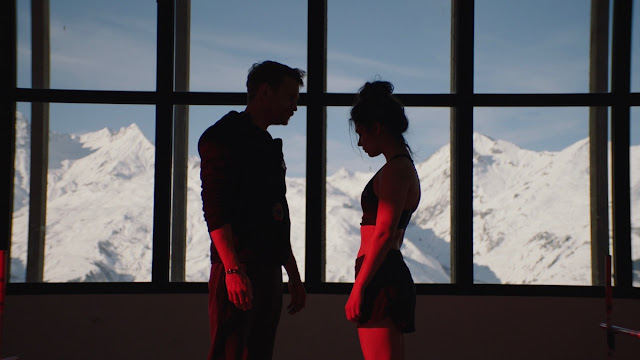SLALOM (2020)
 |
| Critic - No. 184 |
Director: Charlène Favier
Produced by: The Party Film
Sales
Casts: Noée
Abita, Jérémie Renier, Marie Denarnaud
Language: French
Genre: Drama
SYNOPSIS:
Under the
guidance of Fred, a strict ex-champion, a promising 15 year old girl, Lyz
trains as a professional skiing star. Will she be able to endure the physical
and emotional roadblocks along the way?
REVIEW:
For a debut
feature, writer-director Charlène Favier comes up with a powerful coming-of-age
sports drama that engrosses you into the whirlwind of emotions of a sexually abused,
skiing star. Lyz Lopez gets accepted to a prestigious ski training academy in
the French Alps. Isolated in a lily-white snow globe that plays out like a metaphorical
symbol of her spiralling emotions, the academy trains the prodigies in hopes
for the Olympic win of the country. In just the first 30 minutes, we kind of
understand that Lyz is not just blinded by her own ambitions of alpine glory;
she’s just good at skiing and identifies that it might be the fastest way to
win some of the affection that her parents never showed her. With her
mother breaking the news of her new boyfriend, Lyz starts to lean on her
trainer Fred who gradually starts to protect, love and care for her.
What I admired
about 'Salom', is its guts to confront how gross and calculated the relationship
grows. The root of it gets planted when Fred rubs Lyz’s shoulders after he sees
her menstruating in the shower; “Don’t be scared of your period,” he says. “We
can use it. The start of your cycle affects your muscle mass. If you want to
push your body to the limit, you have to listen to it.” This creepy
affection progresses intensely as Fred starts to take control of Lyz’s mind and
body, sexually abusing her with a tint of pleading guilty. Soon we understand
that Fred’s obsession with Lyz is a mere reflection of his frustration with his
injury that stopped him from reaching greater heights in skiing. He somehow
tries to use Lyz for his own ambitious glory. Of course, the beauty of the
villainess is his multi-dimensional character that keeps us pondering about his
real intentions till the end.
As all
teenagers, Lyz displays numerous contradictions and the long takes on her face
at many scenes make us feel her inner emotions that she doesn’t necessarily show
to anyone. Favier embodies a fascinating
level of symbolism in the film that parallels the emotional journey of Lyz. Yann Marituad’s cinematography is top-notch and elevates the metaphorical
visual language Favier roots for. There are a few scenes where lights are
pointed towards pathways where Lyx follows Fred, almost symbolizing the
dependence Lyz yearns for in her life, always taking cue from someone’s vision. In
contrast, the film’s beautiful ending shot shows spotlights staged behind her,
pointing towards the camera with Lyz finally looking at what is in front of
her, all by herself. It was an astonishing indication of Lyz’s clear vision of
the people who really care about her in life. To give justice to the thrill of
the sport, in many instances, the camera slopes alongside the skiers, keeping us in Lyz’s
headspace even when she’s going so fast almost suggesting that the rest of the
world can’t keep up with her intensity of emotions. Favier also uses diegetic
sounds of breezy rumbles of snow to elevate the tension of the plot.
'Slalom'’s success
doesn’t only rely on the subject matter but the tight grip of film language by Favier who progressively knit his thrill carefully,
resulting in a relevant, thought-provoking drama that will connect
universally.
VERDICT:
Charlène Favier
makes an impressive debut with an intense drama about sexual abuse in sports
that mercilessly punches you in the gut.
CELLULOID METER- 4/5:




.jpg)
Comments
Post a Comment